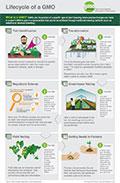ARTICLE: Researchers edit plant DNA using mechanism evolved in bacteria
Below is an excerpt from an article on Phys.org.
"Researchers at the University of Georgia have used a gene editing tool known as CRISPR/Cas to modify the genome of a tree species for the first time. Their research, published recently in the early online edition of the journal New Phytologist, opens the door to more rapid and reliable gene editing of plants.
"By mutating specific genes in Populus—a genus of deciduous trees that includes poplar, aspen and cottonwood—the researchers reduced the concentrations of two naturally occurring plant polymers. One is called lignin, which traps sugars and starches used for biofuel production inside the tree's sturdy cell walls. The other is known as condensed tannin, and its presence in leaves and barks of the tree deters feeding by ruminants, such as deer, cattle, goats and sheep.
"'CRISPR is a relatively new technology, but it could improve our ability to produce novel varieties of food crops, animal feeds and biofuel feedstocks,' said the study's lead researcher C.J. Tsai, a Georgia Research Alliance Eminent Scholar in UGA's Warnell School of Forestry and Natural Resources and department of genetics. 'Compared to some other gene editing techniques, this is incredibly simple, cost-effective and highly efficient, and it could serve as the foundation for a new era of discovery in plant genetics.'"
